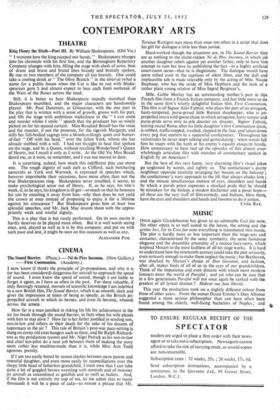CINEMA
The Sound Barrier. (Plaza.)—N6 de Pere Jammu. (New Gallery. —First Communion. (Academy.)
I NOW know (I think) the principle of jet-propulsion, and why it is (or has been considered) dangerous for aircraft to approach the speed of sound. I even know the speed of sound, though I am liable to forget it again, as I have so often in the past. For these valuable, if only fleetingly retained, morsels of scientific knowledge I am indebted to a new British film, The Sound Barrier, which is as smooth, sleek and gives the impression at times of being as speedy, as the British jet- propelled aircraft in which its heroes, and even its heroine, whoosh across the screen.
How far is a man justified in risking his life for achievement in the air (to break through the sound barrier, in fact) when his wife pleads with him to stay alive ? How far is her father justified in sending son, son-in-law and others to their death for the sake of his dreams of supremacy in the air ? This tale of Britain's post-war pace-setting is slung on corny old coat-hangers such as these, and Sir Ralph Richard- son as the production tycoon and Mr. Nigel Patrick as his son-in-law and chief test-pilot do a neat job between them of making the story seem rather less machine-made than it is, while Miss Ann Todd agonises prettily.
If I am too easily bored by screen clashes between stern parent and resentful daughter, and even more easily by reconciliations over the sleepy little head of fatherless grandchild, I must own that I can take quite a lot of goggled heroes wrestling with controls and of monster jet aircraft as streamlined as goldfish and as swift as bullets. And, if the film is not entirely my cup of tea, let me admit that to many thousands it will be a piece of cake—to misuse a phrase shat Mr. Terence Rattigan uses more than once too often in a script that does his gift for dialogue a little less than justice.
Hard-worked though the situations are, in The Sound Barrier they are as nothing to the cliché-ridden Ne de Pere lnconnu, in which yet another daughter rebels against yet another father, only to have him attempt to ruin her love by publishing the.fact—in a highly artificial court-room scene--that he is illegitimate. The dialogue would have seem stilted even in the captions of silent films, and the dull and implausible tale is made tolerable only by the acting of Mlle. Nicole Stephane, who has the stride of Miss Hepburn and the look of a rather plain young relative of Miss Ingrid Bergman's.
Mlle. Gable Morlay has an unrewarding mother's part in this French film from a French-Italian company, and has little more to do in the same firm's wholly delightful Italian film, First Communion. This film is all Signor Aldo Fabrizi, who plays the part of an arrogant, hasty-tempered, purse-proud little Roman shopkeeper, who is jet- propelled into a wild-goose chase in which arrogance, hasty temper and purse-pride serve only to pile disaster on disaster. Signor Fabrizi, tearing round Rome after his little daughter's first Communion dress, is robbed, traffic-copped, insulted, slapped in the face, and taken down every peg that matters to a successful confectioner. Throughout his vicissitudes he never stops talking and gesticulating ; when words fail him he snaps with his teeth at his enemy's equally eloquent hands. How unnecessary to have tied up the episodes of this almost over- whelmingly articulate film with snatches of commentary spoken in English by an American !
But the best of this very funny, very charming film's visual jokes go unglossed by words, and rightly so. The confectioner's pretty neighbour opposite carefully arranging her bosom on the balcony ; the confectioner's wary approach to the lift that always eludes him , and the minute simultaneous motion of eyes, shoulders and hands by which a parish priest expresses a shocked pride that he should be mistaken for the bishop, a modest disclaimer and a pious hope— all these are the very stuff of film-comedy, and Italians, bless them, have the eyes and shoulders and hands and bosoms to do it justice.
CYRIL RAY.


































 Previous page
Previous page